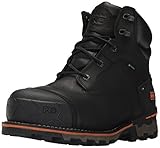Why are leather boots so good? The Benefits of Leather Shoes
They are more durable which makes them an excellent investment. Leather uppers are much softer than man-made uppers. If the leather is treated or waxed then it will be resistant against water and other liquids. As well as being a naturally strong material, leather is also very comfortable.
Why leather is the best material for shoes? The high price of leather is justified. Leather is breathable, elastic, tear proof, abrasion-resistant, heat insulating, and supple. It lends shoes protection with its sturdiness, has a temperature-regulating effect, and lends shoes a sophisticated appearance as well.
Our Top picks
Title
Wolverine Men's Overpass 6" Mid Composite Toe Waterproof Work Boot, Summer Brown, 10.5
Timberland PRO Men's Boondock 6 Inch Composite Safety Toe Waterproof Industrial Work Boot, Black, 10
Cat Footwear mens Second Shift Work Boot, Dark Brown, 10.5 US
Red Wing Heritage Men's Iron Ranger Work Boot, Copper Rough and Tough, 8 D US
Title
Wolverine Men's Overpass 6" Mid Composite Toe Waterproof Work Boot, Summer Brown, 10.5
Title
Timberland PRO Men's Boondock 6 Inch Composite Safety Toe Waterproof Industrial Work Boot, Black, 10
Title
Cat Footwear mens Second Shift Work Boot, Dark Brown, 10.5 US
Title
Red Wing Heritage Men's Iron Ranger Work Boot, Copper Rough and Tough, 8 D US
Why are leather shoes so comfortable? Comfort. A number of factors contribute to making leather shoes so comfortable, especially when compared with synthetic shoes. This naturally elastic material stretches and moulds to your feet, enabling a fit that is quite literally made for you.
Do leather boots last longer? Like any fabric or material, leather will naturally degrade over time. However, boot makers have chosen to work with leather for centuries because it has proven to be an incredibly durable, versatile, and wearable material that also has natural weatherproofing capabilities.
Why are leather boots so good? – Additional Questions
Why do leather boots crack?
The main reason leather cracks and dulls is because its porous surface traps dirt and oils. These irritants break down the dye and texture on the surface of your shoes, causing cracks and discoloration.
How many years do leather boots last?
How long do leather boots last? A good quality leather boot usually lasts for a minimum of two years. High-end boots typically last for more than 5 years, provided that there is no rough usage.
How long should a pair of boots last?
However, you’re probably wearing your shoes every time you go to work. Even the most expensive and durable material will give up, mainly if the footwear is used regularly. On average, the lifespan of work boots is about six to 12 months. Leather boots, when used by a construction worker, can last about six months.
How can I make my leather boots last longer?
The Top 10 Ways to Make Work Boots Last Longer
- 1) Waterproof Your Shoes Immediately.
- 2) Always Undo the Shoelaces.
- 3) Wash Shoes Periodically.
- 4) Dry Wet Shoes Immediately.
- 5) Alternate Shoes.
- 6) Proper Shoe Storage.
- 7) Moisture-Wicking Socks.
- 8) On-the-Go Care.
How do you protect leather boots?
You should spray your boots about once a week, applying the protector the same way you would apply hairspray.
- 2) Moisturize your leather.
- 3) Repair salt or snow stains right away.
- 4) For more durability, add a protective rubber sole.
- 5) Keep an eye on your heels.
- 6) Keep boots in shape with boot trees.
Do leather boots need to be treated?
Factory-fresh boots have a good dose of conditioning and waterproofing in the leather, so you don’t need to do too much right away. Maybe spritz them with a little Nikwax Aqueous ($7.50; www.nikwax.com), an easy-to-use water-repellent that also gives the leather a little conditioning.
Should leather boots feel tight?
Your boots should not feel tight. They should feel snug on the forefoot, they should have plenty of room in the toe box, and the heel should not slip more than a quarter of an inch.
Should new boots be tight?
It should not pinch across the ball of the foot or the toes, but should be comfortably snug in the instep area of your foot. Just like a good handshake. A new boot may slip some when new, but if it is snug in the instep, that slip will come out, after it is flexed from wearing.
Can you soak leather boots in water?
Submerge the Boots in Water
Submerging leather can result in fading and drying out. Fill your bathtub with lukewarm water. Lukewarm water is warm enough to loosen the fibers without damaging them. Submerge your boot foot-part down, preventing significant water from entering the inside.
Will rain ruin leather boots?
Because leather is a porous material, it will quickly soak in that water. This rapid influx of water, followed by a release when the water dries, can lead to premature damage and cracking of the leather. Letting your shoes get soaked in the rain is no way to take care of your investment.
Does rain ruin leather shoes?
Leather shoes are great for many things, but they aren’t naturally great in the rain. Water can soak into the leather, over time it can cause it to crack, and the dreaded ridges of salt marks can permanently distort them.
How do you ruin leather?
5 Things That Ruin Leather (and 3 Things That Fix it)
- Exposure to Sunlight. Leather’s arch-nemesis is that big bright ball in the sky–the sun.
- Extreme Changes in Temperature.
- Not Cleaning Stains Right Away.
- Use Harsh Chemicals and Soaps to Clean Your Leather.
- Too Much Heat.
What should you not use on leather?
When it comes to leather, you’re better off using either water or cleaning products specifically designed for leather. Popular home remedies like baking soda, white vinegar, cream of tartar, and lemon juice can be harsh on delicate leathers and make the problem even worse.
Does water destroy leather?
It’s this shedding of natural oils that causes the leather to lose its supple quality and become stiff and brittle. Water can also cause staining and can move dyes leaving streaks and spots. And if the leather doesn’t dry quickly enough, it could even start to rot.
Is olive oil good for leather?
Olive oil, and every oily substance for that matter, will not “nourish” your leather, but actually accelerate its deterioration. Leather is extremely permeable, and will soak up any oils you put on it. When oil first saturates leather, it seeps to the back—to the part you can’t see.
Is Vaseline good for leather?
You don’t need fancy leather moisturizer to take care of your favourite leather jacket. Petroleum jelly does the job just as well. Apply, rub it in, wipe off the excess, and you’re ready to go.
Is baby oil good for leather?
Just a few drops of baby oil applied with a soft cloth can add new life to an old leather bag or pair of patent-leather shoes. Don’t forget to wipe away any oil remaining on the leather when you’re done.
Can you use Vaseline on leather boots?
Vaseline is definitely good for leather shoes. It can remove scratches, restore shoe color, make your shoes waterproof, and even make them soft and shiny.









